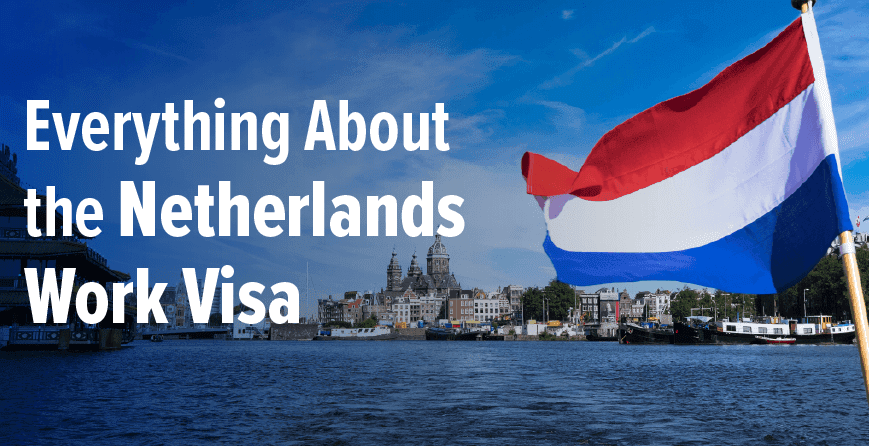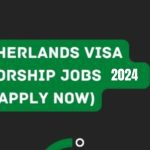Find out all about work visas in the Netherlands, including who needs one, how to apply, and the different types of permits available. If you want to work in the Netherlands, you might need a job offer plus a work visa and residence permit to take up employment. Whether you need a Dutch work visa, and which one you’ll need, depends on your nationality and the type of work you do. Find out all about work visas in the Netherlands by reading the following sections:
- Working in the Netherlands
- Who needs a work visa in the Netherlands?
- Types of work visas in the Netherlands
- Short-stay Dutch work visas
- Temporary work visas in the Netherlands
- Long-stay work visas in the Netherlands
- Work permits in the Netherlands
- Work visas in the Netherlands for students
- Dutch work visas for self-employed, freelancers, and entrepreneurs
- Volunteering and work experience in the Netherlands
- Work visas in the Netherlands for family members
- Appeals and complaints about Dutch work visas
- Useful resources
Working in the Netherlands
The Netherlands has one of the most internationally focused, educated, and multicultural workforces in the world, and there is a strong demand for highly skilled workers. Many from across the globe find work in thriving cities such as Amsterdam, drawn in by reasonable living costs, good wages, and social security benefits, as well as advantages for international employees such as the 30% tax ruling scheme.
The country scores well in all areas of the OECD Better Life Index. In terms of work, 78% of working-age residents are in employment (higher than the OECD average of 66%), and almost nobody works long hours in paid work. The net-adjusted disposable household income is $34,984, which is above the OECD average of $30,490.
Foreign-born residents make up around 13.4% of the Dutch population, including many of working age. A total of 63,605 people migrated to the Netherlands for work purposes in 2019, making up 29.5% of all migrations that year.
Similar to most other European Union (EU) and European Free Trade Association nations (EFTA – Iceland, Liechtenstein, Norway, and Switzerland), the Netherlands has a two-tier immigration system. Those from EU/EFTA states can travel freely to the country for work purposes. However, those from outside the EU/EFTA will usually need a work visa or permit.
These are generally restricted to highly skilled work, seasonal or temporary work, and shortage positions. The Dutch Immigration and Naturalization Service (Immigratie en Naturalisatiedienst – IND) deals with all visa and permit requests in the Netherlands. This includes work visas.
Who Needs a Work Visa in the Netherlands?
EU/EFTA Nationals:
Citizens from the EU/EFTA do not need a visa or residence permit to work in the Netherlands. They can enter the country with a valid ID and look for work.
If you are an EU/EFTA citizen and you will be in the Netherlands for over three months, you must register with your local authority. You will then be entered into the Personal Records Database (Basisregistratie Personen – BRP) and receive a citizen service number (burgerservicenummer – BSN). This is the Dutch social security and tax number, required for many aspects of local life, such as opening a bank account.
Non-EU/EFTA Nationals
Non-EU/EFTA nationals, also known as third-country nationals, usually need a visa or residence permit to work in the Netherlands. Residents of some countries, such as Australia, Japan, and the US, can stay in the Netherlands for up to 90 days without a visa. However, if residents from these countries intend to work during short stays, their employers need a work permit (tewerkstellingsvergunning – TWV) from the Dutch authorities. For longer stays, these nationals must apply for a Dutch residence permit from the IND.
If you are from a country whose citizens can’t enter the Netherlands without a visa, you must apply for your Netherlands work visa and residence permit (machining tot voorlopig verblijf – MVV) before coming to the Netherlands. Check the requirements for your country on the IND website.
UK Nationals After Brexit
Since the UK left the EU on 1 January 2021, British nationals have been subject to immigration controls in all EU/EFTA countries. British citizens can travel and stay in the Netherlands for up to 90 days without a visa or permit. However, they will need a Dutch residence permit for work purposes if they stay for longer than three months. If you are a UK national coming to the Netherlands for less than 90 days and intend to work, your employer needs to apply for a TWV permit.
Types of Work Visas in the Netherlands
There are generally three types of work visas in the Netherlands. These are:
- Short-stay work visas – also known as Schengen category C visas, valid for up to 90 days
- Temporary work visas – usually valid for a maximum of one year and not renewable
- Long-stay work visas – mostly for skilled work in the Netherlands, valid for 1-5 years and renewable
Short-stay Dutch Work Visas
This is the Schengen category C visa for stays of up to 90 days, or a maximum of 90 days within any 180 days You can use this visa for work-related trips, business trips, and short-term work contracts lasting less than three months.
Requirements
Would You Like To Apply For This Jobs/Sponsorship?
Enter Your Email Address HERE & You Will Receive a Notification About Your Application. If it shows "Subscribed" CLICK HERE to follow on Telegram for updatesYou will typically need to have a job offer or an invitation to a work-related event.
How to Apply
You can apply for this visa at the Dutch embassy or consulate in your home country. In addition, your employer must apply for a TWV permit from the Dutch Employees Insurance Agency (UWV) (in Dutch). If you don’t need a visa for the Netherlands, your employer will still have to apply for a TWV.
You should apply for the Schengen short-stay business visa and provide the following:
- Valid passport or travel ID
- Two recent passport photos
- Proof that you can financially support yourself during your stay, for example, bank statements. This currently amounts to around €55 a day.
- Health insurance certificate
- Details of your accommodation covering your stay
- Confirmation of your job offer
- Details of your return flight confirming that you will leave the Netherlands at the end of your work-related event
You should receive a decision on your visa application within 15 days. If your visa is granted, you’ll usually need to collect it from the embassy or consulate.
Visa Costs
This visa costs €80. You need to make payment upfront along with your application.
Visa Length
Short-stay visas are valid for a maximum of 90 days within 180-d180 days not be extended unless there are exceptional circumstances.
Temporary Work Visas in the Netherlands
Temporary work visas in the Netherlands are for contracted work lasting longer than three months but no more than a year. Current temporary visas available are:
- Seasonal worker visa – for work in the Dutch agricultural sector. This visa is valid for a maximum of six months.
- Working Holiday Program (WHP) visa – available to nationals of nine countries aged between 18-30 and valid for up to one year.
- Au pair visa – those aged 18-30 can use this visa to work as an au pair in the Netherlands for up to one year.
Requirements
You need to have a valid offer of employment or confirmation of acceptance onto a program to obtain a temporary work visa. If you want to work as an au pair, you will need to apply through a sponsoring au pair agency and have an offer from a Dutch family that has agreed to host you during your stay.
How to Apply
The application procedure depends on the type of visa and where you are applying from. If you need an MVV to enter the Netherlands, you should apply through the Dutch embassy or consulate in your home country. Alternatively, your sponsoring employer or organization can apply on your behalf through the IND, and you can then pick up your MVV from the Dutch embassy or consulate in your home country.
If you are coming on an au pair visa, the au pair agency has to make the application on your behalf.
You will need a residence permit from the IND, while your employer needs to obtain a work permit (TWV) from the UWV. In the case of seasonal work, the residence and TWV are combined in a single permit (gecombineerde vergunning voor verblijf en arbeid – GVVA). Typically, the employer makes the application for a GVVA to the IND
To make an application, you will need to provide:
- Valid passport or travel ID
- Two passport photos
- Confirmation of job/program offer or provisional employment contract
- Health insurance coverage (usually paid for by the employer for seasonal workers)
- Evidence of clean criminal record
- Completed sponsor declaration form
- Proof that you have sufficient financial resources to support yourself if coming on a WHP visa
Residents from some countries also need to undergo tuberculosis (TB) tests.
The IND will decide on your application within 90 days. If successful, you can collect your MVV (if needed) from your Dutch embassy or consulate and then get your residence permit/GVVA from the IND around two weeks after arriving.
Visa costs
The costs are €69 for the WHP visa and €345 for the au pair visa. The seasonal worker visa costs €207, which the sponsoring employer usually pays.
Visa length
Seasonal worker visas are valid for up to six months, while WHP and au pair visas are valid for a maximum of one year and are not renewable. While on a WHP visa, you can only undertake employment that is permitted as part of the program.
Long-stay work visas in the Netherlands
This is the visa for most work contracts in the Netherlands, where the employment offer is usually for at least one year. Current long-stay work visas in The Netherlands include:
- General work in paid employment visa – the standard permit for most forms of work in the Netherlands. It is valid for up to three years and renewable, usually up to a maximum of five years.
- Highly skilled migrant visa – for high-level positions with a minimum salary requirement, usually valid for five years.
- EU Blue Card – a permit for high-skilled workers that can be used across EU/EFTA countries. This visa is valid for four years and renewable.
- Intra-corporate transfer (ICT) visa – valid for three years (or one year for trainees), for managers, specialists, and trainees of multinational firms transferred to the Netherlands.
- Researcher visa – to carry out academic or professional research work, valid for five years.
Requirements
You will usually need an offer of employment from a sponsoring organization. This must be from a recognized sponsor in the case of highly-skilled and researcher visas. In addition to this, most job offers must come with a competitive salary that meets Dutch income requirements
How to Apply
Your employer usually makes your long-stay Netherlands work visa application. They will apply to the IND for your Dutch residence permit/MVV and the UWV for your work permit (TWV). In many cases, they can now apply to the IND for the single permit (GVVA), which combines the residence permit and TWV.
You will need to provide the following (translated into Dutch, English, French, or German if necessary):
- Valid passport or travel ID
- Two passport photos
- Confirmation of job offer, for example, an employment contract
- Educational qualifications or CV
- Proof that your salary meets the necessary income requirements
- Health insurance coverage
- Criminal record check
- Sponsorship declaration form (for non-recognized sponsors)
There may be additional documentation requirements, depending on the job you are applying for. Residents from some countries also need to undergo tuberculosis (TB) tests.
For most long-stay work visas, you can choose to apply yourself. However, it’s usually a good idea if your employer applies on your behalf. If you do apply yourself, you can do this through the Dutch embassy or consulate in your home country. If you don’t need an MVV to enter the Netherlands, you can apply through the IND for your residence permit within three months of arriving. Your employer will still have to apply for a TWV before you can start work. If you’re using the combined GVVA permit, your employer has to make the application.
Long-stay visa applications in the Netherlands can take up to 90 days to process, reduced to a maximum of 60 days for researcher visas. If successful, you can pick up your MVV (if needed) from the Dutch embassy or consulate in your home country. Your residence permit/GVVA should be ready to pick up from the IND within two weeks of arriving in the Netherlands.
Visa Costs
Long-stay work visas generally cost €345. For researcher visas, the cost is €207. Employers typically pay for the ICT visas.
Visa Length
Visa/permit lengths vary according to the type of visa and the length of your job contract. Typically, they will be valid for 1-5 years but are usually renewable. In some cases, you receive a permit for an initial period of one year, and you can renew it through the IND.
You should inform the IND if you change your job. Your new employer will usually have to apply for a new work permit in your name. If you lose your job and become unemployed, your visa typically expires. In most cases, you have three months to find a new job that meets all the standard requirements. It’s possible to switch from one type of visa to another if you meet the requirements, for example, moving from a highly skilled visa to an EU Blue Card.
Work Permits in The Netherlands
The Netherlands still uses work permits (Tewerkstellingsvergunning – TWV), which are used alongside visas and residence permits. Employers need to apply for a TWV for each foreign worker from the Dutch Employee Insurance Agency (Uitvoeringsinstituut Werknemersverzekeringen – UWV) before they can start working in the Netherlands. Most foreign workers need a TWV. However, some positions, such as academic research posts, don’t require one.
The Dutch authorities have simplified procedures in recent years and have introduced a single permit (gecombineerde vergunning voor verblijf en arbeid – GVVA), which combines the residence permit and the work permit. Employers apply for this from the IND. The GVVA is now the most common permit in the Netherlands. However, some sectors still use separate residence permits and TWV work permits.
Work Visas in the Netherlands For Students
You can work while on a study visa in the Netherlands as long as your visa/permit has a TWV sticker on the back and any employer you work for has applied for a TWV from the UWV. Although students from the EU/EFTA can usually work without restriction during their studies in the Netherlands, non-EU/EFTA students on a visa/permit are restricted to working a maximum of 16 hours per week during term time. This increases to full-time during June, July, and August.
Students on a visa/permit in the Netherlands can apply for an orientation year visa to stay in the country and look for work, start their own business, or become a freelancer. This visa is valid for one year. If you successfully find employment during this time, you can switch to a relevant Dutch work visa or permit.
Dutch Visas For Self-Employed, Freelancers, and Entrepreneurs
If you want to come to the Netherlands to start your own business or work as a freelancer, you can apply for a visa/permit as a self-employed person. This is valid for up to two years for €1,446 and is renewable if the business is a success.
To apply for this work visa in the Netherlands, you will need to show:
- Your business idea will benefit the Dutch economy
- You have sufficient experience and qualifications to run your business
- Registration details with the Dutch Trade Register if you start up a registered business
- Necessary trade licenses to work as a freelancer in certain fields
- Detailed business plan to support your business idea
- Evidence that you will be able to earn a sufficient salary to meet national income requirements
- Details of at least one client if applying as a freelancer
You have to make your application through the same channels as for other Dutch work visas and need to provide the same general documents, for example, your passport and a criminal record check.
If you are an entrepreneur with an innovative business idea, you may be able to apply for a start-up visa/permit. This costs €349 and is valid for one year, after which you can switch to a general self-employed visa. With a start-up visa, you can access additional government start-up support and will also be able to apply for visas to employ essential specialist staff from abroad. To apply for this visa, you need to have a recognized facilitator or mentor who will help you set up your business.
Volunteering and Work Experience in the Netherlands
There are a few different visas for volunteering or work experience in the Netherlands. These are:
- Schengen short-stay business visa – you can use this visa to cover short-term voluntary or work experience placements lasting 90 days or less. This visa costs €80.
- Cultural exchange visa – for foreign nationals aged 18-30 to stay in the Netherlands for up to one year. This visa permits voluntary work but not paid work and costs €345.
- Work experience visa – to take up a placement with a sponsoring organization as a trainee or apprentice. The permit is valid for up to a year and sometimes allows paid work. It also costs €345.
- Working Holiday Program (WHP) visa – This visa is valid for up to one year and allows residents aged 18-30 from nine countries to volunteer and carry out limited paid work to finance their trip. It costs €69.
The application process for these visas is the same as for other short-stay and temporary Dutch work visas.
Work Visas in The Netherlands For Family Members
Spouses/partners and children can join those on most long-term work visas in the Netherlands. If you are working on a short-stay visa or a temporary visa, such as the seasonal worker visa, then your relatives cannot join you. Relatives have to apply for their visa/residence permit as family members and usually have the same rights to work as the family member they are joining. If they take up work, their employer needs to get a TWV permit for them.
Relatives of EU/EFTA citizens living in the Netherlands can travel freely to join without a visa or permit, even if they are personally from outside the EU/EFTA. This applies to spouses/partners, under-21s, parents, and grandparents. These relatives can take up employment without a work permit. They simply need to register with their local authority to enter into the Personal Records Database (Basisregistratie Personen – BRP) and get a citizen service number (burgerservicenummer – BSN).
Spouses/partners and children aged under 18 who want to join non-EU/EFTA nationals living long-term or permanently in the Netherlands usually need to apply for a family visa. The process for this is similar to the process for other visas and permits. It costs €207 for spouses/partners and €69 for children. If you join family members in the Netherlands on a family visa, you usually have the same employment rights as they have. Your employer will need to obtain a TWV before employing you.
Appeals and Complaints About Work Visas in the Netherlands
The ID makes the final decisions on applications for visas, permits, citizenship, and asylum. If the IND rejects your application for a work visa in the Netherlands and you feel this is unfounded, you can appeal the decision within four weeks of receiving it. You need to send a written objection that details your reasons for your appeal.
The IND will review your appeal and decide within 6-19 weeks. In certain complicated cases, the process may take up to 25 weeks. If the original decision is upheld and you are still unhappy, you can take the matter to a Dutch court (information in Dutch).
If you want to make a general complaint to the IND, you can do so using an online form. Make sure you give full details about what you’re complaining about and what you want the outcome to be.
The IND has six weeks to respond to your complaint. If you are not happy with the complaint, you have two options:
- Contact the National Ombudsman (website in Dutch) to ask for a review of your complaint. You need to do this within one year of the decision.
- Take your complaint to the Petitions Committee of the Parliament (website in Dutch) or the Petitions Committee of the Senate (website in Dutch).
Useful Resources
- Immigration and Naturalization Service (Immigratie- en Naturalisatiedienst – IND) – deals with all issues concerning work visas and residence permits in the Netherlands
- Government of the Netherlands (Rijksoverheid) – Dutch government website
- Dutch Employee Insurance Agency(Uitvoeringsinstituut Werknemersverzekeringen – UWV) – issues work permits in the Netherlands (website in Dutch)






